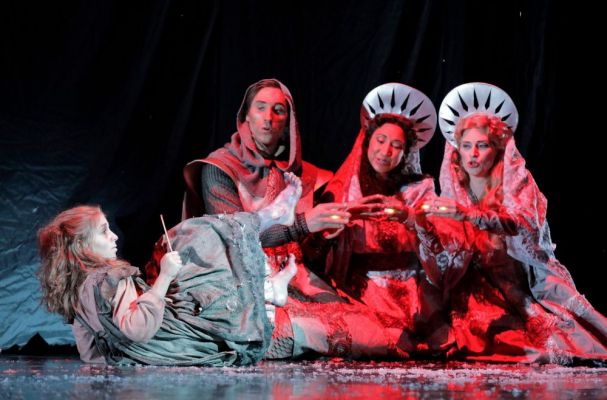Home > Home - Featured
08/02/2017
Two David Lang operas at Portland Opera
By HOLLY JOHNSON // Lang doesn’t lean upon narrative to tell a story: rather, he surrounds us with ideas.
It is hard to put a finger on the sounds that David Lang makes. His music is difficult and unconventional, and it defies definition. But once you’ve heard it, it stays in your blood stream. The human breath is always felt behind his vocal utterances, and there’s a sense of pulsing, yearning, hesitancy, of eeriness, ambiguity and riveting emotion defining his work.
The Portland Opera is offering two of his one-act operas, the stunning, Pulitzer prize winning ” The Little Match Girl Passion” and “The Difficulty of Crossing a Field” through August 5 at Portland’s Newmark Theater. Both pieces are imaginatively stage-directed by Jerry Mouawad of Imago Theatre, who comes from the world of physical theater, and his approach fits Lang’s minimalist, complex work so very well.
Lang doesn’t lean upon narrative to tell a story: rather, he surrounds us with ideas, repeats them and time becomes compressed. I might add here that these are pieces that combine opera and theater, with both dialogue and sung bits.
“Field” is the first piece offered, and it was, for me, the most complex; yet if you let the whole visual and auditory event wash over you, the experience is as powerful as narrative opera. Surreal pieces of verse are echoes in both spoken sections and arias, in this tale about a disappearance. Based on Ambrose Bierce’s very short story “The Difficulty of Crossing a Field.” (Rumor has it that Bierce himself, an abolitionist, died a mysterious death).
Here the African American slaves and the white slave owners and their families are divided onstage, but a hesitant movement amongst all of them prevails as each group speculates on Mr.Williamson’s disappearance one day. There’s a hole in the truth, a lyric tells us. What happened? Did he die or disappear, and does it matter which?The slaves, whose answers in the court room don’t count, have a dark take on the event, indirect, oblique and confusing. Actors move around a circular platform, the mentally disturbed Mrs. Williamson (a marvelously eerie portrayal by Hannah S. Penn) and her daughter (the talented Cree Carrico) among them (her questions circle the truth). As the tenor slave, Martin Bakari lights up the stage with a dynamic presence and superb voice. A string group accompanies the singers, echoing the sounds and odd rhythms of the dialogue with precision.
“The Little Match Girl Passion” is accessible because we already know the story from Hans Christian Andersen. It is also inspired by the Passion of Christ. Singers dressed in white and gold with angel-like headdresses combine biblical and fantasy imagery. The music here has more appeal and solidity as this wrenching story unwinds. The repetitious phrasing takes on a compelling urgency.
A girl (played by Max Young in rather dirty makeup).sells matches on a city street on new year’s eve. It’s bitter cold, and to keep warm, she lights the matches, bringing forth warm fantasies of home and hearth and her beloved grandmother, who loved her when she was alive. There’s a liturgical quality to this short opera that is powerful, a repetition that creates a sense of sorrow. Besides performers listed above, other fine cast members include Lisa Williamson, Laila Murphy, Chrisian Zaremba, Martin Bakari and movement artist Carol Triffle,








